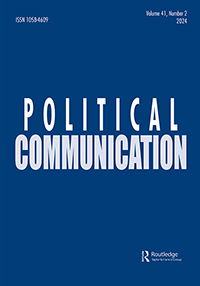Making their Mark? How protest sparks, surfs, and sustains media issue attention
IF 4.6
1区 社会学
Q1 COMMUNICATION
引用次数: 0
Abstract
ABSTRACT Media attention is both an important outcome and a resource for protest groups. This paper examines media-movement dynamics using television news coverage of 1,277 protests in Belgium (2003–2019). We situate protest coverage in media issue attention cycles and scrutinize whether features of protest or rather media issue attention fluctuations are key for protest’s agenda-setting effect. Our results show that while most protests fail to alter the attention cycle, a considerable share of protests is followed by a significant increase in media issue attention, especially when surfing issue attention already on the rise. Overall, media issue attention cycles rather than protest features affect protest’s agenda-setting effect, suggesting that protest agenda-setting is more a matter of exploiting discursive opportunities than of forcing one’s issue on the media agenda by signaling newsworthiness. These findings have serious implications for our understanding of protest group agency in news making and agenda-setting.留下印记?抗议活动如何激发、推动并维持媒体的关注
媒体关注是抗议团体的重要成果和资源。本文使用比利时(2003-2019)1277次抗议活动的电视新闻报道来研究媒体运动动态。我们将抗议报道置于媒体议题关注周期中,并仔细研究抗议的特征或媒体议题关注波动是否是抗议议程设置效应的关键。我们的研究结果表明,虽然大多数抗议活动未能改变关注周期,但相当一部分抗议活动之后,媒体对问题的关注显著增加,尤其是在冲浪问题关注度已经上升的情况下。总体而言,媒体议题关注周期而不是抗议特征影响抗议的议程设置效应,这表明抗议议程设置更多的是利用话语机会,而不是通过发出新闻价值的信号,迫使自己的问题进入媒体议程。这些发现对我们理解抗议团体在新闻制作和议程设置中的作用具有重要意义。
本文章由计算机程序翻译,如有差异,请以英文原文为准。
求助全文
约1分钟内获得全文
求助全文
来源期刊

Political Communication
Multiple-
CiteScore
13.90
自引率
2.70%
发文量
30
期刊介绍:
Political Communication is a quarterly international journal showcasing state-of-the-art, theory-driven empirical research at the nexus of politics and communication. Its broad scope addresses swiftly evolving dynamics and urgent policy considerations globally. The journal embraces diverse research methodologies and analytical perspectives aimed at advancing comprehension of political communication practices, processes, content, effects, and policy implications. Regular symposium issues delve deeply into key thematic areas.
 求助内容:
求助内容: 应助结果提醒方式:
应助结果提醒方式:


